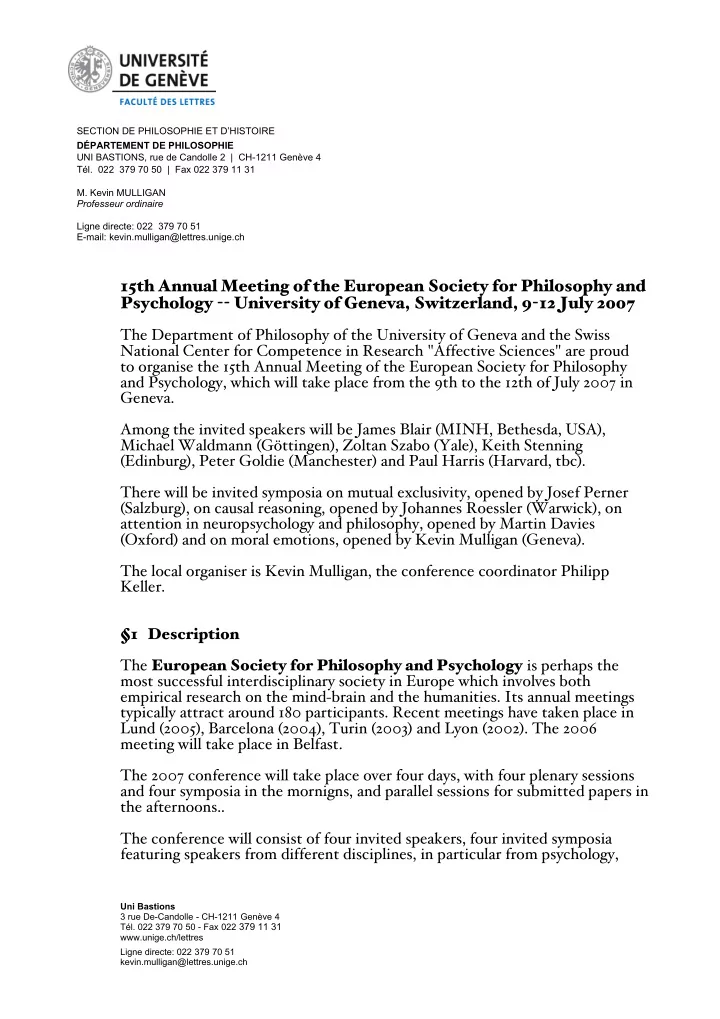

SECTION DE PHILOSOPHIE ET D’HISTOIRE DÉPARTEMENT DE PHILOSOPHIE UNI BASTIONS, rue de Candolle 2 | CH-1211 Genève 4 Tél. 022 379 70 50 | Fax 022 379 11 31 M. Kevin MULLIGAN Professeur ordinaire Ligne directe: 022 379 70 51 E-mail: kevin.mulligan@lettres.unige.ch 15th Annual Meeting of the European Society for Philosophy and Psychology -- University of Geneva, Switzerland, 9 - 12 July 2007 The Department of Philosophy of the University of Geneva and the Swiss National Center for Competence in Research " Affective Sciences " are proud to organise the 15th Annual Meeting of the European Society for Philosophy and Psychology, which will take place from the 9th to the 12th of July 2007 in Geneva. Among the invited speakers will be James Blair ( MINH, Bethesda, USA ) , Michael Waldmann ( G ö ttingen ) , Zoltan Szabo ( Yale ) , Keith Stenning ( Edinburg ) , Peter Goldie ( Manchester ) and Paul Harris ( Harvard, tbc ) . There will be invited symposia on mutual exclusivity, opened by Josef Perner ( Salzburg ) , on causal reasoning, opened by Johannes Roessler ( Warwick ) , on attention in neuropsychology and philosophy, opened by Martin Davies ( Oxford ) and on moral emotions, opened by Kevin Mulligan ( Geneva ) . The local organiser is Kevin Mulligan, the conference coordinator Philipp Keller. §1 Description The European Society for Philosophy and Psychology is perhaps the most successful interdisciplinary society in Europe which involves both empirical research on the mind-brain and the humanities. Its annual meetings typically attract around 180 participants. Recent meetings have taken place in Lund ( 2005 ) , Barcelona ( 2004 ) , Turin ( 2003 ) and Lyon ( 2002 ) . The 2006 meeting will take place in Belfast. The 2007 conference will take place over four days, with four plenary sessions and four symposia in the mornigns, and parallel sessions for submitted papers in the afternoons.. The conference will consist of four invited speakers, four invited symposia featuring speakers from different disciplines, in particular from psychology, Uni Bastions 3 rue De-Candolle - CH-1211 Genève 4 Tél. 022 379 70 50 - Fax 022 379 11 31 www.unige.ch/lettres Ligne directe: 022 379 70 51 kevin.mulligan@lettres.unige.ch
philosophy, linguistics and cognitive science. Approximately 100 submitted papers will be presented. Around 180 people are expected to attend. There will be two poster sessions. The format to be followed is that employed in very many successful meetings of the ESPP. Each day begins with a talk of 30-45 minutes by an invited speaker, followed by 30-45 minutes for discussion. This is followed by a 2 hour symposium. Afternoons are given over to parallel sessions for invited talks. The ESPP prize for the best paper by a student is will be awarded. The call for papers, the program, registration, travel and accommodation information is available at: http://www.unige.ch/lettres/philo/espp07.html §2 Justification The European Society for Philosophy and Psychology ( http://www.eurospp.org/ ) is perhaps the most successful interdisciplinary society in Europe which involves both empirical research on the mind-brain and the humanities. The invitation to hold the 2007 annual meeting in Geneva was accepted for the following reasons. First, in 2005 Geneva became the leading House for the national research pole ( NCCR ) in affective sciences ( http://www.affective-sciences.org/ ) , of which Kevin Mulligan is one of the two Deputy-Directors. This very large interdiciplinary projet brings together psychologists, neurologists, economists and the humanities in the form of philosophers, historians of religion and jurists. The Centre ' s research program is structured around three aspects of emotions: emotions as complex multi-faceted reactions to our surroundings, emotions as disruptive states requiring control and regulation, and emotions as themselves a regulating force in society. Consequently the individual research projects are organised around three domains of research related to these aspects : • emotion elicitation and perception, • emotion regulation, • and social functions of emotions. The ESPP meeting in Geneva will provide a unique opportunity for interaction between colleagues from all over Europe and the members of the 11 sub-projects which make up the Swiss NCCR. The committee of the ESPP has agreed that the topic of the emotions will figure prominently in the meeting.
Secondly, the ESPP meeting will allow the new generation of young Swiss researchers in psychology, neurology and the humanities to present their work and so, by making themselves known, improve their career prospects. Thirdly, the ESPP meeting will form an important part of the activities of the NCCR during 2007, in particular of its postgraduate programme. Several events immediately before and after the meeting will be able to profit from the presence in Geneva of a large number of leading researchers. The 2001 meeting of the Society was held in Freiburg, Switzerland and subsidised in part by the ASSH. Thus the planned 2007 meeting will help to reinforce the research presence of Switzerland. It is perhaps worth noting that in my own field, philosophy, several young Swiss researchers have been appointed over the last ten years to senior positions all over the world. The 2007 meeting of the ESPP and this application are actively supported by the main philosophers of mind in Switzerland, Professors Martine Nida- Ruemelin ( FR ) , Pascal Engel ( GE ) , Michael Esfeld ( LA ) , Hans-Bernhard Schmid ( BA ) and Gianfranco Soldati ( FR ) . They expect that their collaborators will submit papers for the 2007 ESPP meeting. The scientific results of the planned 2007 ESPP meeting will follow the pattern established by earlier meetings. It is expected that 2-3 books and journal special numbers will emerge from the meeting. §3 Budget cf. attached
Recommend
More recommend